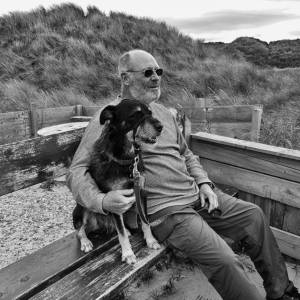Declaration
14.5C with bright spells and a few showers. Breezy.
Apothecary7, Maeve the Deerhound and I went through to Arbroath after lunch to see the reenactment of the signing of the Declaration of Arbroath, 690 years to the day since the event. The reenactment was part of the Year of Homecoming and Tartan Day.
As we walked up from the car park towards the Abbey we passed the reenactors gathering for a photo call and took full advantage by stopping to grab a shot or two.
Some background information:
The Declaration of Arbroath April 6 1320
The Letter of 1320 from the Barons of Scotland to Pope John XXII, popularly known as the Declaration of Arbroath, was composed during a two year truce from Christmas 1319, in the long war with England arising from King Edward I's attempt to conquer Scotland in 1296.
More than five years after the Battle of Bannockburn (1314) and despite other Scottish victories, Edward II persisted in the war and had enlisted the support of the Pope who consistently refused to recognise Robert Bruce' as king.
As a diplomatic move, the Scots sent this collective Letter to the Pope to convince him they were united in their resolve to preserve their independence. The Letter is framed as a petition to the Pope in the most polished and eloquent Latin - believed to be the work of Bernard, Abbot of Arbroath and Chancellor of Scotland. It emphasises Scotland's long history as an independent Christian kingdom and dwells on its sufferings since Edward I's aggression. It next asserts the whole people's loyalty to King Robert Bruce and their determination never to yield to England but to maintain their freedom at all costs. It also declares that if Robert abandons this task he would be cast out and another King chosen "to defend our freedom". Finally, it beseeches the Pope to exhort King Edward "to leave us Scots in peace", pledging them in that event to join in a Crusade, and solemnly commends the justice of their cause to God.
The original letter delivered to the Pope at Avignon is lost, but a contemporary copy made for the record is preserved in Register House, Edinburgh. The Pope acknowledged the Declaration on August 28th 1320, and wrote to Edward II urging him to make peace, though without effect.
In 1324, the Pope decided to address Robert Bruce as king, but it was not until 1328 that King Edward III formally recognized King Robert's title and the independence of Scotland.
Bernard's Letter has been described as "one of the masterpieces of political rhetoric of all time." Its most famous passage reads:
"For so long as a hundred of us are left alive, we will yield in no least way to English dominion. We fight not for glory nor wealth nor honours, but only and alone we fight for freedom, which no good man surrenders but with his life..."

Comments
Sign in or get an account to comment.


